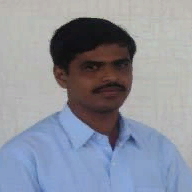
Nagaraja B.G.
Work place: Department of Information Science and Engineering Siddaganga Institute of Technology, Tumkur-572103, Karnataka, India
E-mail: nagarajbg@gmail.com
Website:
Research Interests: Speech Synthesis, Speech Recognition, Pattern Recognition
Biography
Mr. Nagaraja B.G. was born in India in the year 1982. He received the B.E. degree in Electronics and Communications Engineering from Bapuji Institute of Technology, Davangere, Karnataka, India, in the year 2004 and the M.Tech degree in Computer Science and Engineering from East-West Institute of Technology, Bangalore, India, in the year 2009. He is currently pursuing the Ph.D. degree at the Visvesvaraya Technological University, Belgaum, Karnataka, India. He has been working as a Research Assistant in the department of Information Science and Engineering, Siddaganga Institute of Technology, Tumkur, Karnataka, India. His research interests include speech, Multilingual Speaker Recognition.
Author Articles
Kannada Language Parameters for Speaker Identification with The Constraint of Limited Data
DOI: https://doi.org/10.5815/ijigsp.2013.09.03, Pub. Date: 8 Jul. 2013
In this paper we demonstrate the impact of language parameter variability on mono, cross and multi-lingual speaker identification under limited data condition. The languages considered for the study are English, Hindi and Kannada. The speaker specific features are extracted using multi-taper mel-frequency cepstral coefficients (MFCC) and speaker models are built using Gaussian mixture model (GMM)-universal background model (UBM). The sine-weighted cepstrum estimators (SWCE) with 6 tapers are considered for multi-taper MFCC feature extraction. The mono and cross-lingual experimental results show that the performance of speaker identification trained and/or tested with Kannada language is decreased as compared to other languages. It was observed that a database free from ottakshara, arka and anukaranavyayagalu results a good performance and is almost equal to other languages.
[...] Read more.Other Articles
Subscribe to receive issue release notifications and newsletters from MECS Press journals